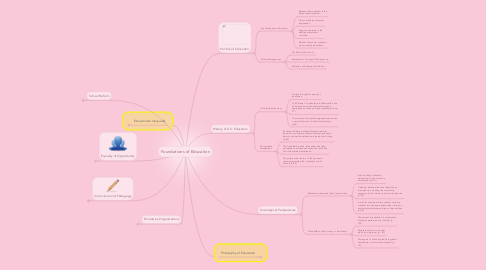
1. Educational Inequality
1.1. Sociological Explanations of Unequal Achievement
1.1.1. 1.
1.1.2. 2.
1.1.3. 3.
1.2. School Centered Explanation
1.2.1. 1.
1.2.2. 2.
1.2.3. 3.
2. Equality of Opportunity
2.1. Educational Achievement and Attainment
2.1.1. 1.
2.1.2. 2.
2.1.3. 3.
2.2. Response to Coleman Study
2.2.1. 1.
2.2.2. 2.
2.2.3. 3.
3. Curriculum and Pedagogy
3.1. Historical Curriculum Theory
3.1.1. 1.
3.1.2. 2.
3.1.3. 3.
3.2. Sociological Curriculum Theory
3.2.1. 1.
3.2.2. 2.
3.2.3. 3.
4. School Reform
4.1. School-Based Reforms
4.1.1. 1.
4.1.2. 2.
4.1.3. 3.
4.2. Societal, Community, Economic, or Political Reforms
4.2.1. 1.
4.2.2. 2.
5. Schools as Organizations
5.1. Governance
5.1.1. Senators
5.1.2. House of Representatives
5.1.3. State Superintedant
5.1.4. State School Board Representantive
5.1.5. Local Superintendant
5.1.6. Local School Board
5.2. Comparison to One Country
6. History of U.S. Education
6.1. Civil Rights Movement
6.1.1. Fought the right for equity of education.
6.1.2. 1954 Brown v. Topeka Board of Education: the Supreme Court ruled that state-imposed segregation of schools was unconstitutional (p 77).
6.1.3. The demand for equality opportunity has been a central feature of United States History (p76).
6.2. Conservative Perspectives
6.2.1. Ravitch and Hirsch believed that the historical pursuit of social and political objectives resulted in harm to the traditional academic goals of schooling (p 85).
6.2.2. The Troubled Crusade talks about the using education to solve social issues has led to the fall of educational excellence.
6.2.3. The progressive reforms of the twentieth century denigrated the traditional role of schools (p 85).
7. Philosophy of Education
7.1. Generic Notions
7.2. Key Researchers
7.3. Goal of Education
7.4. Role of the Teacher
7.5. Curicculum
7.6. Method of Instruction
8. Politics of Education
8.1. Four Purposes of Education
8.1.1. Believes that capitalism is the best economic system.
8.1.2. Does not like government intervention.
8.1.3. Supports returning to the traditional academic curriculum
8.1.4. Believes that social problems are caused by individuals.
8.2. Political Perspectives
8.2.1. The Role of the School:
8.2.2. Explanations of Unequal Performance:
8.2.3. Definition of Educational Problems
9. Sociological Perspectives
9.1. Relationship between School and Society
9.1.1. Schools shape children's perceptions of the world by socialization (p117)
9.1.2. Durkheim believed that education has an importance in creating the moral unity necessary for for harmony and social cohesion (p118)
9.1.3. In well functioning society, schools socialize students into the appropriate values, and sort and select students according to their abilities (p118)
9.2. Three Effects of Schooling on Individuals
9.2.1. The amount of education is only weakly related to performance of the job (p 122).
9.2.2. People learn how to do their jobs by doing them (p. 122).
9.2.3. More years of schooling leads to greater knowledge and social participation (p 121).

